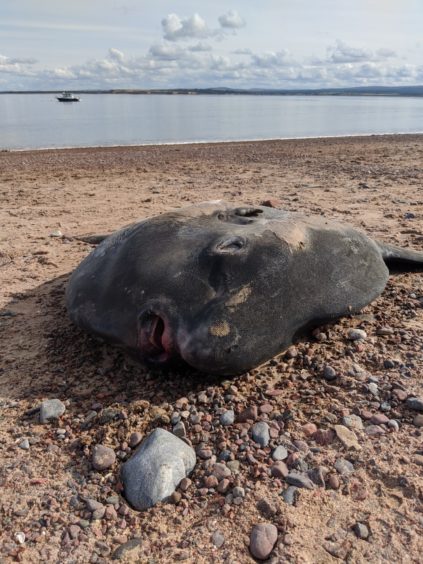Residents in a north village were left surprised when a huge tropical fish washed up on their beach.
At 6ft across from fin to fin, the creature was soon identified as one of the largest bony fish in the world – the sunfish.
The fish is considered a delicacy in Asia, and is an endangered species.
The specimen on Rosemarkie beach was far from the one-tonne weight achieved by others of its kind, coming in at a mere 300lb or so, but it still required four men to carry it off the beach.
Residents alerted Marine Scotland and the Scottish Marine Animal Stranding Scheme (SMASS), part of Scotland’s Rural College (SRUC).
A team from SMASS transported the fish to SRUC’s chiller in Alcaig where it will remain until it is collected by National Museums Scotland (NMS).
Dr Andrew Kitchener, principal curator of vertebrates at NMS said: “We hope to add the sunfish to our internationally significant natural sciences research collections.
“These collections are invaluable to researchers working across many fields of natural sciences.
“Having such an extensive collection and multiple specimens of a wide variety of species allows for comparative studies between different environments and time periods.
“Sunfish are found rarely in Scotland, and so we are pleased to have this opportunity to add this specimen to the National Collection”.
Meanwhile, news of the sunfish reached marine biologist Theo Bennison of the Macduff Marine Aquarium.
He had hoped to take possession of the fish to skeletonize for the aquarium, but was pipped at the post by NMS.
He said: “Sunfish are native to tropical and temperate waters, and can be found here at around this time when the water is at its warmest.
“We have some of the most productive feeding grounds in the world, and they come here for things like jellyfish, fish larvae and crustaceans.
“Like basking sharks, they find their food in the top 300 or so feet of the ocean.
“Astonishingly for its size, sunfish have been known to jump out of the water.
“Even more astonishing, they produce more than 300 million eggs at one time, compared to a cod which produces up to 20 million.”
